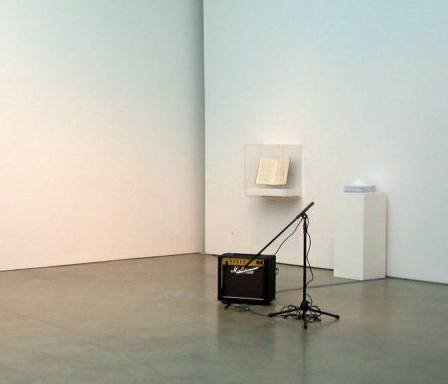Stefan Bruggemann
dal 7/2/2008 al 19/4/2008
Segnalato da
7/2/2008
Stefan Bruggemann
Kunsthalle Bern, Bern
The works of Mexican artist question the idea of transferring or mirroring information. For this solo-exhibition, Bruggemann proposes a large, walk-in "black box" located at the core of a retrospective presentation of his infamous wall-texts. His principal mode of operation is to inject pop sensibility into conceptualist strategies.

The works of Mexican artist Stefan Brüggemann (°1975) are devised to create a polemic.
Not a polemic about language, as might be expected having the many text pieces in mind, but about pictures. Brüggemann is interested in ‘Words That Become Pictures’ and ‘Pictures That Become Words’. In this way he questions the idea of transferring or mirroring information. Language becomes a way of remembering, of reflecting and refracting events. His laconic picture-signs act as memorials to ‘language that must be reactivated’. They create imaginary spaces or experiences for the audience invoked by words. These spaces are produced through the individual act of looking, and each look is always new, notwithstanding the familiarity of the statement. Indeed, it is precisely the intelligibility of the text, which allows the viewer to formulate an experience, since the artist intends no ambiguity. Brüggemann’s words are his, though the resulting images are not controlled by the artist, but by the viewer in the act of perceiving, remembering and creating anew for themselves.
For his exhibition at the Kunshalle Bern, Brüggemann proposes a large, walk-in ‘black box’ located at the core of his presentation of selected wall-texts from his prodigious output over the past decade. The black box is ‘basically just output, with no input’, as Brüggemann observes. Yet it is, of course, something, which is not nothing, in spite of any effort to ensure that it might be otherwise. It is as abrasively insistent, contrarian and self-defeating in its address and effect.
The show features two works from a recent series called Obliteration. The scribbled neon text is a gestural analogy to writing and un-writing. From the negative of the word and the event of writing, to the idea of denial as an absolute and autonomous power, the Obliterations feature the concept of ‘no’ as an empty, powerful, independent and fruitful source, that articulates in its various manifestations concepts such as rejection, non-conformity and absence. One of Stefan Bruggemann´s principal strategies is to inject pop sensibility into conceptualist strategies. In their implicit denial of language these lights represent both the search for new grounds, and the impossibility of the very same. Charged with the destructive nature of punk, Obliteration Series constitutes a double negation.
In Cinématte Brüggemann presents “A Production of Nothing” (2006), a short film that considers the condition of productivity and of un-productivity, as well as the meaning of the activity of doing nothing and its countless possibilities. This work, that has an awkward bi-polarity between what is seen and what is heard, establishes an almost contradictory relation between a strong cinematic imagery and the deeply conceptual and reflexive ideas expressed through the narrators voice. On one hand, the film depicts scenes that could belong to an element of mass culture, such as a video clip or an advertisement. One the other, it deals with deep philosophical concerns that could be related to Derrida's deconstructive ideas on nothingness.
The soundtrack, created by the Barcelona based dj and music producer Cristian Vogel, is made through the recording of the white noise produced when no sound instrument is connected to a mixing table. This is the same soundtrack as the one heard inside the Black Box exhibited in the Kunsthalle. In dealing with these two elements at the same time, popular culture and intellectual reflections, Brüggemann uses a medium that is rarely seen in his praxis to explore similar ideas to the ones expressed in most of his work.
A book focussing on the recent work of Stefan Brüggemann, edited by Nicolas de Oliveira and with texts by Chris Kraus, Caomhín Mac Giolla Léith and Michael Bracewell will be published by JRP/Ringier
The exhibition is a collaboration of the Kunsthalle Bern and Frac Bourgogne in Dijon and benefits the support from the Mexican Embassy in Bern, Cinématte Bern and Blow de la Barra Gallery, London.
Opening february 8, 2008
Kunsthalle Bern
Helvetiaplatz 1 - Bern



